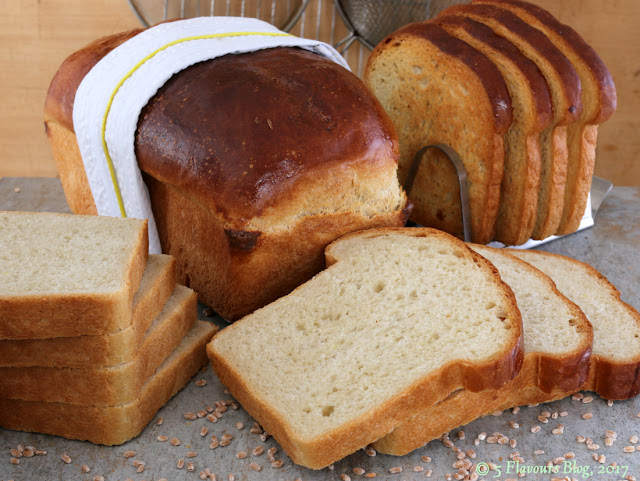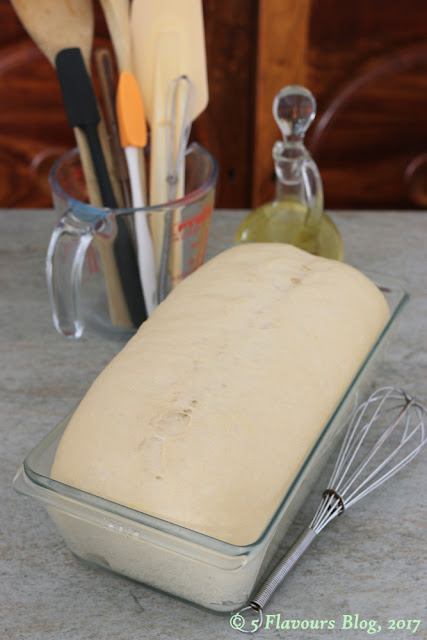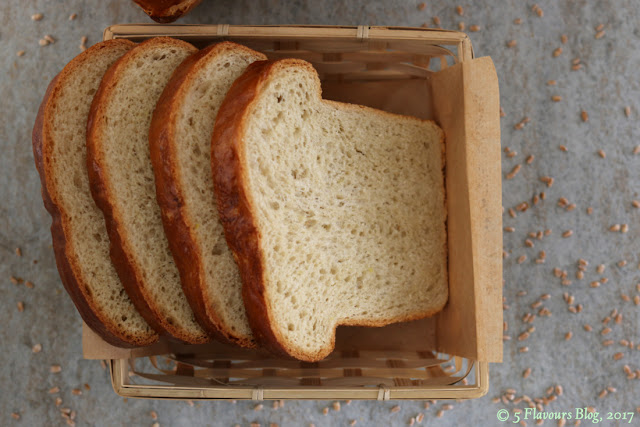Supreme Sandwich Bread
The Staff Of Life ...
Good
bread – from the preparation through to the eating – is a sensual, visceral
experience engaging the soul and all the senses. Excellent bread can be a
spiritual experience. After all, is it not written “Give us this day our daily
bread”? Note: not peace, happiness, love, prosperity, water or wine, but BREAD.
With the proliferation of artisanal bakeries and global economic insecurity, bread
has become a universal language understood by everyone from the fabulously
wealthy to the gutter poor.
Mrs.
MFK Fisher summarizes the process of baking bread very eloquently:
“It
does not cost much. It is pleasant: one of those almost hypnotic businesses,
like a dance from some ancient ceremony. It leaves you filled with peace, and
the house filled with one of the world's sweetest smells. But it takes a lot of
time. If you can find that, the rest is easy. And if you cannot rightly find
it, make it, for probably there is no chiropractic treatment, no Yoga exercise,
no hour of meditation in a music-throbbing chapel, that will leave you emptier
of bad thoughts than this homely ceremony of making bread.”
― MFK Fisher,
How to Cook a Wolf
Everyday
bread – the staff of life stuff – is not an art but a skill acquire-able by
anyone. Granted, good bread does require patience, a modicum of technical
knowledge and understanding, and also a measure of respect for the ingredients.
You will be working with yeast: a living (albeit mindless) organism that you
will nurture and provide with optimal living conditions only to kill it off
later. But while the yeast lives it transforms flour (starch, proteins, fiber
& some minerals), water and salt into bread that will still hunger, nourish
the body and uplift the spirit during baking and the initial cutting of that
crisp, deep brown and full flavoured crust. This bread baking skill only requires
a bit of regular practice to develop and expand.
Before
I become too lyrical in musing on the metaphysical: today’s recipe is for
plain, yet satisfying, white bread – the trusty ol’ sandwich loaf. Sunflower
oil keeps the bread soft, humid and supple while extending it’s shelf life to four
or five days (depending on how it is stored). Maybe the best property of this
bread is the toast it provides the foundation for. It will leave you weak in
the knees.
Recipe yields:
|
Preparation time:
|
Baking time:
|
Difficulty level:
|
10 – 12 Slices
|
± 150 minutes
|
45 min
|
Easy
|
Special Equipment Required:
1
x Electrical mixer in the Kenwood Chef or Kitchen Aid class
1
x Loaf pan, ± 2.5L capacity (30cm long x 10cm wide x 8cm high)
Ingredients:
Instant yeast
|
10g
|
Sugar
|
10ml
|
Luke warm water
|
100ml
|
White bread / high gluten
flour
|
750g
|
Sunflower oil
|
100g
|
Sugar
|
45ml
|
Salt
|
10ml
|
Warm water
|
± 350ml
|
Egg, beaten
|
1
|
Full cream milk
|
30ml
|
Method:
1. Activate the yeast:
Combine the yeast and 10ml sugar in a measuring jug or bowl. Add 100ml of warm
water – not hot – and mix thoroughly. Set aside on a warm, undisturbed area of
the kitchen counter for the yeast to activate. The yeast will foam and rise up
within 15 minutes. Stir the head of yeast foam back into the liquid before use.
2. Combine the activated
yeast liquid, flour, oil, salt and second portion of sugar in the mixer bowl. Scrape
all the yeast liquid and foam from its container into the mixer bowl.
3. Mount the mixer bowl in
the mixer, attach the dough hook and start mixing on slow speed. Add the warm
water in small additions. Mix until the dough come together around the hook in
a somewhat sticky ball. Use a plastic spatula to scrape the dough down as
necessary into the bowl. Add extra flour if the dough is very wet and sticky.
4. Remove and cover the
mixer bowl with a lightly oiled film of cling wrap or a plastic grocery bag.
Set the bowl aside in a warm, draft free area of your kitchen and allow to rise
until the dough doubled in volume, approx. 45 – 60 minutes, depending on
ambient temperature.
5. Lightly oil an A3 page
sized area of your kitchen counter surface. Knock the dough back when ready,
turn out onto the oiled surface and knead lightly by hand for 2 – 3 minutes
until firm. Press the dough into a rough rectangle approximately the length of
the bread pan. Roll the dough up, starting at one of the long edges, into a
rough roll. Fold the ends in underneath to neaten the roll and place it –
‘seam’ side down – into the well greased bread pan. Use your thumb (or the
handle of the spatula) to press a deep furrow along the middle of the dough
along the length of it. This will prevent the bread from rising lopsided or
bursting open in the oven.
6. Re-cover with the oiled
plastic film and set aside to rise again until the dough rises over the top
edge of the pan; approx. 30 – 45 minutes depending on ambient temperature. Do
not be tempted to allow the dough to rise too far out over the top of the pan.
During baking, the over-risen bread will overflow the pan’s sides and the
middle will sag to form an unsightly, saddle-like depression in the centre of
the loaf.
7. Combine the egg and milk
and mix well. Paint this egg wash gently and liberally over the top of the
risen dough for a good browning of the bread on top during baking.
8. Bake 15 minutes at 200°C
(390° Fahrenheit) in a pre-heated convection oven or at 210°C (410° Fahrenheit)
in a normal, static oven. Turn the heat down to 165°C (330° Fahrenheit) for the
convection oven and bake a further 30 minutes. Bake 40 minutes at 180°C (355°
Fahrenheit) for a normal, static oven. The bread will be ready when it sounds
hollow when knocked on top, or a skewer inserted into the centre will come out
clean.
9. Remove from the oven and
allow to cool 5 minutes in the pan on a wire cooling rack. Use oven mitts and
turn the bread out. Allow to cool to room temperature under a dry tea towel.
Comments:
¨ The dough can also be proofed in a stove’s warm drawer or
inside an oven at its very lowest temperature setting. Switch both off after
reaching temperature and before putting the dough in for the first rise.
MFK Fisher:
Mrs.
Fisher was a somewhat Bohemian dear from the previous century who attained fame
as an excellent writer on food, cooking and gastronomy, amongst others.
She
had the privilege to spend a considerable part of her life in France,
particularly the rural and semi rural areas. This taught her a deep
appreciation for simple but excellent ingredients, honest dishes without
pretense and the true nature of simple, yet elegant gastronomy. She successfully
pulled these experiences through to her writing and became famous for her
particular philosophical approach to the art of writing on – and about – cooking,
food and the eating there off.
This
link provides
a good (if somewhat breathless) overview of Mrs. Fisher’s most important works.
Image source:
MFK
Fisher : http://inkwellmanagement.com/client/m.f.k.-fisher
© RS Young, 2017
– RECIPE INDEX PAGE –
Follow Me on Facebook
Note:
Post
updated on 2024.03.15 to include:
1.
The updated Recipe for downloading as a PDF file, and
2.
Recipe Title and Print Recipe, Recipe Index and Facebook & Pinterest follow
links.








Comments
Post a Comment